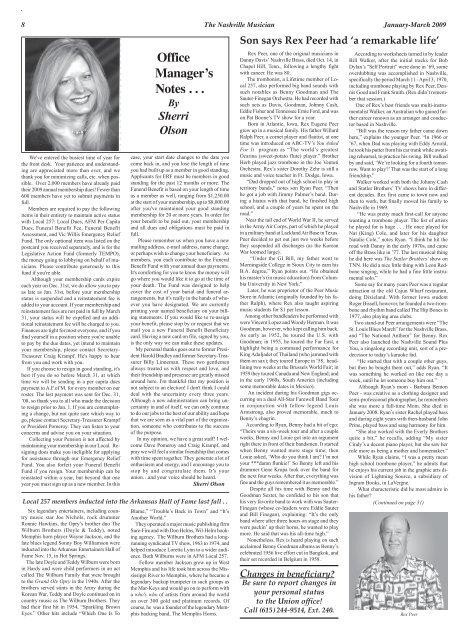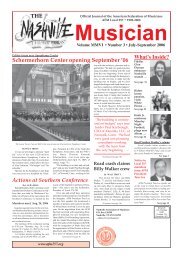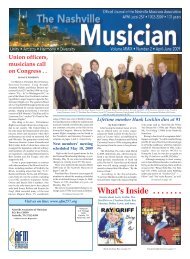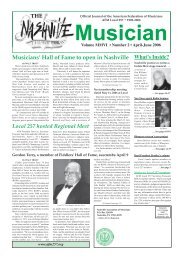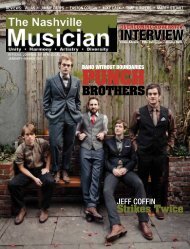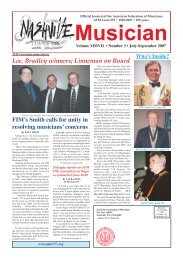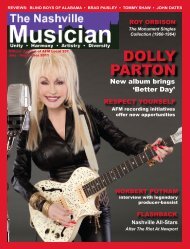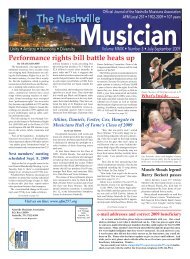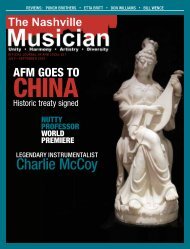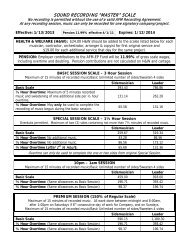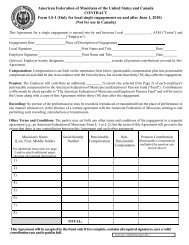Musicians Jan - 01 - Nashville Musicians Association
Musicians Jan - 01 - Nashville Musicians Association
Musicians Jan - 01 - Nashville Musicians Association
You also want an ePaper? Increase the reach of your titles
YUMPU automatically turns print PDFs into web optimized ePapers that Google loves.
8 The <strong>Nashville</strong> Musician <strong>Jan</strong>uary-March 2009<br />
We've entered the busiest time of year for<br />
the front desk. Your patience and understanding<br />
are appreciated more than ever, and we<br />
thank you for minimizing calls, etc. when possible.<br />
Over 2,000 members have already paid<br />
their 2009 annual membership dues! Fewer than<br />
600 members have yet to submit payments in<br />
full.<br />
Members are required to pay the following<br />
items in their entirety to maintain active status<br />
with Local 257: Local Dues, AFM Per Capita<br />
Dues, Funeral Benefit Fee, Funeral Benefit<br />
Assessment, and Vic Willis Emergency Relief<br />
Fund. The only optional item was listed on the<br />
postcard you received separately, and is for the<br />
Legislative Action Fund (formerly TEMPO),<br />
the money going to lobbying on behalf of musicians.<br />
Please contribute generously to this<br />
fund if you're able.<br />
Although your membership cards expire<br />
each year on Dec. 31st, we do allow you to pay<br />
as late as <strong>Jan</strong>. 31st, before your membership<br />
status is suspended and a reinstatement fee is<br />
added to your account. If your membership and<br />
reinstatement fees are not paid in full by March<br />
31, your status will be expelled and an additional<br />
reinstatement fee will be charged to you.<br />
Finances are tight for most everyone, and if you<br />
find yourself in a position where you're unable<br />
to pay by the due dates, yet intend to maintain<br />
your membership, please contact Secretary-<br />
Treasurer Craig Krampf. He's happy to hear<br />
from you and work with you.<br />
If you choose to resign in good standing, it's<br />
best if you do so before March 31, at which<br />
time we will be sending in a per capita dues<br />
payment to A.F.of M. for every member on our<br />
roster. The last payment was sent for Dec. 31,<br />
’08, so thank you to all who made the decision<br />
to resign prior to <strong>Jan</strong>. 1. If you are contemplating<br />
a change, but not quite sure which way to<br />
go, please contact Secretary-Treasurer Krampf<br />
or President Pomeroy. They can listen to your<br />
concerns and advise you on your situation.<br />
Collecting your Pension is not affected by<br />
maintaining your membership in our Local. Resigning<br />
does make you ineligible for applying<br />
for assistance through our Emergency Relief<br />
Fund. You also forfeit your Funeral Benefit<br />
Fund if you resign. Your membership can be<br />
reinstated within a year, but beyond that one<br />
year you must sign up as a new member. In this<br />
Office<br />
Manager’s<br />
Notes . . .<br />
By<br />
Sherri<br />
Olson<br />
case, your start date changes to the date you<br />
come back in, and you lose the length of time<br />
you had built up as a member in good standing.<br />
Applicants for ERF must be members in good<br />
standing for the past 12 months or more. The<br />
Funeral Benefit is based on your length of time<br />
as a member as well, ranging from $1,250.00<br />
at the start of your membership, up to $8,000.00<br />
after you've maintained your good standing<br />
membership for 20 or more years. In order for<br />
your benefit to be paid out, your membership<br />
and all dues and obligations must be paid in<br />
full.<br />
Please remember us when you have a new<br />
mailing address, e-mail address, name change,<br />
or perhaps wish to change your beneficiary. As<br />
members, you each contribute to the Funeral<br />
Benefit Fund with your annual dues payments.<br />
It's comforting for you to know the money will<br />
go where you would like it to go at the time of<br />
your death. The Fund was designed to help<br />
cover the cost of your burial and funeral arrangements,<br />
but it's really in the hands of whoever<br />
you have designated. We are currently<br />
printing your named beneficiary on your billing<br />
statements. If you would like to re-assign<br />
your benefit, please stop by or request that we<br />
mail you a new Funeral Benefit Beneficiary<br />
card. Having a new card on file, signed by you,<br />
is the only way we can make these updates.<br />
My personal thanks goes out to former President<br />
Harold Bradley and former Secretary-Treasurer<br />
Billy Linneman. These two gentlemen<br />
always treated us with respect and love, and<br />
their friendship and presence are greatly missed<br />
around here. I'm thankful that my position is<br />
not subject to an election! I don't think I could<br />
deal with the uncertainty every three years.<br />
Although a new administration can bring uncertainty<br />
in and of itself, we can only continue<br />
to do our jobs to the best of our ability and hope<br />
that we are seen as a vital part of the organization,<br />
someone who contributes to the success<br />
of the purpose.<br />
In my opinion, we have a great staff! I welcome<br />
Dave Pomeroy and Craig Krampf, and<br />
pray we will feel a similar friendship that comes<br />
with time spent together. They generate a lot of<br />
enthusiasm and energy, and I encourage you to<br />
stop by and congratulate them. It's your<br />
union…and your voice should be heard.<br />
Sherri Olson<br />
Local 257 members inducted into the Arkansas Hall of Fame last fall . .<br />
Six legendary entertainers, including country<br />
music star Joe Nichols, rock drummer<br />
Ronnie Hawkins, the Opry’s brother duo The<br />
Wilburn Brothers (Doyle & Teddy), noted<br />
Memphis horn player Wayne Jackson, and the<br />
late blues legend Sonny Boy Williamson were<br />
inducted into the Arkansas Entertainers Hall of<br />
Fame Nov. 15, in Hot Springs.<br />
The late Doyle and Teddy Wilburn were born<br />
in Hardy and were child performers in an act<br />
called The Wilburn Family that were brought<br />
to the Grand Ole Opry in the 1940s. After the<br />
brothers served stints in the Army during the<br />
Korean War, Teddy and Doyle continued on in<br />
country music as The Wilburn Brothers. They<br />
had their first hit in 1954, “Sparkling Brown<br />
Eyes.” Other hits include “Which One Is To<br />
Blame,” “Trouble’s Back in Town” and “It’s<br />
Another World.”<br />
They operated a major music publishing firm<br />
Sure-Fire and with Don Helms, Wil-Helm booking<br />
agency. The Wilburn Brothers had a longrunning<br />
syndicated TV show, 1963 to 1974, and<br />
helped introduce Loretta Lynn to a wider audience.<br />
Both Wilburns were in AFM Local 257.<br />
Fellow member Jackson grew up in West<br />
Memphis and his life took him across the Mississippi<br />
River to Memphis, where he became a<br />
legendary backup trumpeter in such groups as<br />
the Mar-Keys and would go on to perform with<br />
a who's who of artists from around the world<br />
on over 300 gold and platinum records. Of<br />
course, he was a founder of the legendary Memphis<br />
backing band, The Memphis Horns.<br />
Son says Rex Peer had ‘a remarkable life’<br />
Rex Peer, one of the original musicians in<br />
Danny Davis’ <strong>Nashville</strong> Brass, died Oct. 14, in<br />
Chapel Hill, Tenn., following a lengthy fight<br />
with cancer. He was 80.<br />
The trombonist, a Lifetime member of Local<br />
257, also performed big band sounds with<br />
such notables as Benny Goodman and The<br />
Sauter-Finegan Orchestra. He had recorded with<br />
such acts as Davis, Goodman, Johnny Cash,<br />
Eddie Fisher and Tennessee Ernie Ford, and was<br />
on Pat Boone’s TV show for a year.<br />
Born in Atlantic, Iowa, Rex Eugene Peer<br />
grew up in a musical family. His father Willard<br />
Ralph Peer, a cornet player and flautist, at one<br />
time was introduced on ABC-TV’s You Asked<br />
For It program as “The world’s greatest<br />
Ocarina (sweet-potato flute) player.” Brother<br />
Herb played jazz trombone in the Joe Ventuti<br />
Orchestra. Rex’s sister Dorothy Zehr is still a<br />
music and voice teacher in Ft. Dodge, Iowa.<br />
“Dad dropped out of high school to play in<br />
territory bands,” notes son Ryan Peer. “Then<br />
he got a job with Jimmy Palmer’s band. During<br />
a hiatus with that band, he finished high<br />
school, and a couple of years he spent on the<br />
road.”<br />
Near the tail end of World War II, he served<br />
in the Army Air Corps, part of which he played<br />
in a military band at Lackland Air Base in Texas.<br />
Peer decided to get out just two weeks before<br />
they suspended all discharges (as the Korean<br />
War loomed large).<br />
“Under the GI Bill, my father went to<br />
Morningside College in Sioux City to earn his<br />
B.A. degree,” Ryan points out. “He obtained<br />
his master’s (in music education) from Columbia<br />
University in New York.”<br />
Later, he was proprietor of the Peer Music<br />
Store in Atlantic (originally founded by his father<br />
Ralph), where Rex also taught aspiring<br />
music students for $1 per lesson.<br />
Among other bandleaders he performed with<br />
were Vincent Lopez and Woody Herman. It was<br />
Goodman, however, who kept calling him back.<br />
As early as 1952, he toured the U.S. with<br />
Goodman; in 1955, he toured the Far East, a<br />
highlight being a command performance for<br />
King Aduljadet of Thailand (who jammed with<br />
them on sax); they toured Europe in ’58, headlining<br />
two weeks at the Brussels World Fair; in<br />
1959 they toured Canada and New England; and<br />
in the early 1960s, South America (including<br />
some memorable dates in Mexico).<br />
An incident during his Goodman gigs occurring<br />
on a dual All-Star Farewell Band Tour<br />
in conjunction with fellow legend Louis<br />
Armstrong, also proved memorable, much to<br />
Benny’s chagrin.<br />
According to Ryan, Benny had a bit of ego:<br />
“Theirs was a six-week tour and after a couple<br />
weeks, Benny and Louie got into an argument<br />
right there in front of their bandsmen. It started<br />
when Benny wanted more stage time; then<br />
Louie asked, ‘Who do you think I am? I’m not<br />
your ***damn flunkie!’ So Benny left and his<br />
drummer Gene Krupa took over the band for<br />
the next four weeks. After that, everything was<br />
fine and the guys remembered it as memorable.”<br />
Despite all his time with Benny and the<br />
Goodman Sextet, he confided to his son that<br />
his very favorite band to work with was Sauter-<br />
Finegan (whose co-leaders were Eddie Sauter<br />
and Bill Finegan), explaining: “It’s the only<br />
band where after three hours on stage and they<br />
were packin’ up their horns, he wanted to play<br />
more. He said that was his all-time high.”<br />
Nonetheless, Rex is heard playing on such<br />
acclaimed Benny Goodman albums as Benny’s<br />
celebrated 1956 live effort cut in Bangkok, and<br />
their set recorded in Belgium in 1958.<br />
Changes in beneficiary?<br />
Be sure to report changes in<br />
your personal status<br />
to the Union office!<br />
Call (615) 244-9514, Ext. 240.<br />
According to worksheets turned in by leader<br />
Bill Walker, after the initial tracks for Bob<br />
Dylan’s “Self Portrait” were done in ’69, some<br />
overdubbing was accomplished in <strong>Nashville</strong>,<br />
specifically the period March 11 - April 3, 1970,<br />
including trombone playing by Rex Peer, Dennis<br />
Good and Frank Smith. (Rex didn’t remember<br />
that session.)<br />
One of Rex’s best friends was multi-instrumentalist<br />
Walker, an Australian who gained further<br />
career renown as an arranger and conductor<br />
based in <strong>Nashville</strong>.<br />
“Bill was the reason my father came down<br />
here,” explains the younger Peer. “In 1966 or<br />
’67, when Dad was playing with Eddy Arnold,<br />
he took his putter from his car trunk while awaiting<br />
rehearsal, to practice his swing. Bill walked<br />
by and said, ‘We’re looking for a fourth tomorrow.<br />
Want to play?’ That was the start of a long<br />
friendship.”<br />
Walker worked with both the Johnny Cash<br />
and Statler Brothers’ TV shows here in different<br />
decades. Rex first came to town now and<br />
then to work, but finally moved his family to<br />
<strong>Nashville</strong> in 1969.<br />
“He was pretty much first-call for anyone<br />
wanting a trombone player. The list of artists<br />
he played for is huge . . . He once played for<br />
Nat (King) Cole, and later for his daughter<br />
Natalie Cole,” notes Ryan. “I think he hit the<br />
road with Danny in the early 1970s, and came<br />
off the Brass like in ’77. The last musical thing<br />
he did here was The Statler Brothers’ show on<br />
TNN. He did a nice little thing with Leon Redbone<br />
singing, while he had a fine little instrumental<br />
solo.”<br />
Some say for many years Peer was a regular<br />
attraction at the old Cajun Wharf restaurant,<br />
doing Dixieland. With former Iowa student<br />
Roger Bissell, however, he founded a two-trombone<br />
and rhythm band called The Hip Bones in<br />
1977, also playing area clubs.<br />
Two stand-out Peer arrangements were “The<br />
St. Louis Blues March” for the <strong>Nashville</strong> Brass,<br />
and “The National Anthem” for Benny. Rex<br />
Peer also launched the <strong>Nashville</strong> Sound Plus<br />
You, a singalong recording unit, sort of a predecessor<br />
to today’s karaoke fad.<br />
“He started that with a couple other guys,<br />
but then he bought them out,” adds Ryan. “It<br />
was something he worked on like one day a<br />
week, until he let someone buy him out.”<br />
Although Ryan’s mom - Barbara Benton<br />
Peer - was creative as a clothing designer and<br />
semi-professional photographer, he remembers<br />
she was more a full-time Mom. She died in<br />
<strong>Jan</strong>uary 2008. Ryan’s sister Rachel played bass<br />
and during eight years with then-husband John<br />
Prine, played bass and sang harmony for him.<br />
“She also worked with the Everly Brothers<br />
quite a bit,” he recalls, adding “My sister<br />
Cindy’s a decent piano player, but she saw her<br />
role more as being a mother and homemaker.”<br />
While Ryan claims, “I was a pretty mean<br />
high school trombone player,” he admits that<br />
he enjoys his current job in the graphic arts division<br />
of Lightning Source, a subsidiary of<br />
Ingram Books, in LaVergne.<br />
What characteristic did he most admire in<br />
his father?<br />
(Continued on page 31)<br />
Rex Peer


